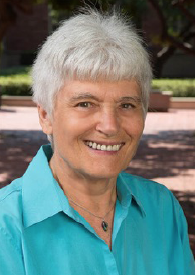Minkova, Donka
Associate Dean of Humanities
Kaplan 202
Tel: 310.825.4978 / E-mail
Education
Ph.D. University of Sofia.
Interests
History and Structure of the English Language, History of English Verse.
Additional Information
Main interests: English language history, phonology, metrics. Professor since 1992. She is the author of The History of Final Vowels in English (1991), English Words: History and Structure (with Robert Stockwell) (2001, Second Edition 2009), Alliteration and Sound Change in Early English (2003) and A Historical Phonology of English (2014). She is editor of Phonological Weakness in English. From Old to Present-Day English (2009) and co-editor of Studies in the History of the English Language: A Millennial Perspective (2002), Chaucer and the Challenges of Medievalism (2003), and Empirical and Analytical Advances in the Study of English Language Change (2009). She has published widely in the fields of English and Germanic historical phonology and syntax, historical dialectology, English historical metrics. She has held the Annual Fellowship at the Institute for Advanced Studies in the Humanities at the University of Edinburgh, the University of California President’s Research Fellowship in the Humanities, The John Simon Guggenheim Foundation Fellowship. In 2000 she co-founded the conference series Studies in the History of the English Language (SHEL). She is on the editorial boards of Diachronica, English Language and Linguistics, Journal of Germanic Linguistics, Journal of English Linguistics, Transactions of the Philological Society (TPS), Edinburgh University Press English Language Series, Peter Lang Verlag’s Studies in English Medieval Language and Literature, Warsaw Studies in English Language and Literature, and Palgrave Studies in Language History and Language Change. She has served as Vice-Chair and Chair of the UCLA CAP, Vice-Chair and Chair of the system-wide UCAP, Vice-Chair and Chair of the UCLA Council on Research, Executive Committee Member and Vice-President of SGL. Since 2012 she has also served as Associate Dean of Humanities at UCLA.
Research Articles and Book Chapters
| 2019 | Examining the evidence for phonemic affricates: ME /t͡ʃ/, /d͡ʒ/ or [t-ʃ], [d-ʒ]? In Alcorn et al. (eds.) Historical Dialectology in the Digital Age. Edinburgh UP. 156-184. https://doi.org/10.3366/edinburgh/9781474430531.003.0008
|
| 2018 | Language tests for the identification of Middle English Tail-Rhyme Romances. In Ad Putter and Judith Jefferson (eds.) The Transmission of Medieval Romance. Woodbridge, Suffolk: Boydell and Brewer, 127-149. |
| 2018 | English word clipping in a diachronic perspective. In Peter Petré, Hubert Cuyckens, Frauke D’hoedt (eds.) Papers from ICEHL 18, Amsterdam: John Benjamins, 227-252. https://www.jbe-platform.com/content/books/9789027263995-cilt.343.10min
|
| 2017 | Verse form as a mirror of history: From Old to Middle English. In Madlen Danova, Snezhina Dimitrova, Mira Kovacheva (eds.) Нови Направления в синхронната и диахронната фонетика и фонология (New Directions in Synchronic and Diachronic Phonetics and Phonology), University of Sofia Press, 9-29. Link
|
| 2017 | “Prosody”. In English Historical Linguistics. An International Handbook, ed. by Alexander Bergs and Laurel Brinton. Berlin: Mouton de Gruyter, Handbücher zur Sprach- und Kommunikationswissenschaft, Second Edition, 57-77.
DOI 10.1515/9783110525281-004 DOI 10.1515/9783110525281-004
|
| 2017 | Donka Minkova and Emily Runde. Genre, audience, and scribal adaptation to language change: The case of infinitival marking. In: Jacek Fisiak, Magdalena Bator, Marta Sylwanowicz (eds.) Studies in Middle English Language and Literature, Bern: Peter Lang Verlag, 95-121.
|
| 2016 | From stop-fricative clusters to contour segments in early English. In Don Chapman, Colette Moore and Miranda Wilcox (eds.) Studies in the History of the English Language VII. Generalizing vs. Particularizing Methodologies in Historical Linguistic Analysis (TiEL 94), pp. 29-61, Berlin: Mouton de Gruyter. Link to pdf
|
| 2016 | Prosody-meter correspondences in late Old English and in the Middle English Poema Morale. In Leonard Neidorf, Rafael J. Pascual, Tom Shippey (eds.) Old English Philology: Studies in Honor of R.D. Fulk. Boydell and Brewer, 122-144. https://www.jstor.org/stable/10.7722/j.ctt1c3gxtd.13
|
| 2016 | Donka Minkova and Kie Ross Zuraw. Ambisyllabicity in English: present and past. In M. Kytö and P. Pahta (eds.) Handbook of English Historical Linguistics, Cambridge University Press, pp. 424-444. DOI: https://doi.org/10.1017/CBO9781139600231.026
|
| 2015 | Establishing phonemic contrast in written sources. In P. Honeybone and J. Salmons (eds.) The Oxford Handbook of Historical Phonology, 72-85. OUP. https://doi.org/10.1093/oxfordhb/9780199232819.013.024
|
| 2015 | A U-turn and its consequences for the history of final schwa in English. In Christina Sanchez- Stockhammer (ed.) Studies in Variation, Contacts and Change in English (VARIENG), Volume 16, 2015. Link to pdf
http://www.helsinki.fi/varieng/series/volumes/16/Minkova (?)
|
| 2015 | Metrical resolution, spelling, and the reconstruction of Old English syllabification. In Michael Adams, R. D. Fulk, and L. Brinton (eds.), Studies in the History of the English Language VI: Evidence and Methods in Histories of English. Berlin: Mouton de Gruyter, 2015, 137-161. Link to pdf |
|
2014 |
Ad Putter, Judith Jefferson, Donka Minkova. Dialect, rhyme, and emendation in Sir Tristrem. The Journal of English and Germanic Philology, Vol. 113, No. 1, pp. 73-93. https://www.jstor.org/stable/10.5406/jenglgermphil.113.1.0073
|
| 2014 | Judith A. Jefferson, Donka Minkova and Ad Putter Perfect and Imperfect Rhyme: Romances in the abab Tradition. Studies in Philology, 111:4, 631-651. https://www.jstor.org/stable/pdf/24392097.pdf
|
| 2013 | Reconstructing stress in Old and Middle English. In Research Methods in Language Variation and Change, ed. by Manfred Krug and Julia Schlüter. Cambridge University Press, 2013, 260-278. https://doi.org/10.1017/CBO9780511792519.018
|
New: A Historical Phonology of English
For a full bibliography see: Full Bibliography
Interest Areas
• History of the English Language
• Medieval Studies
